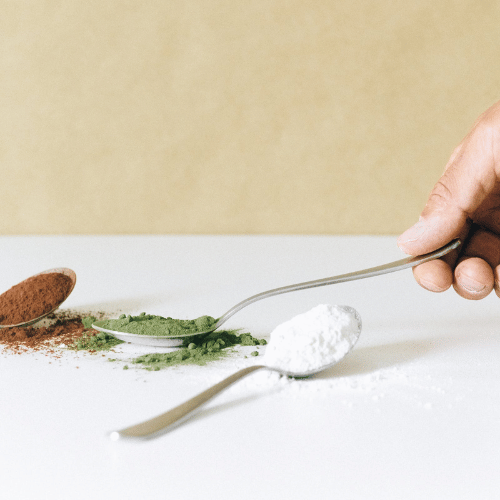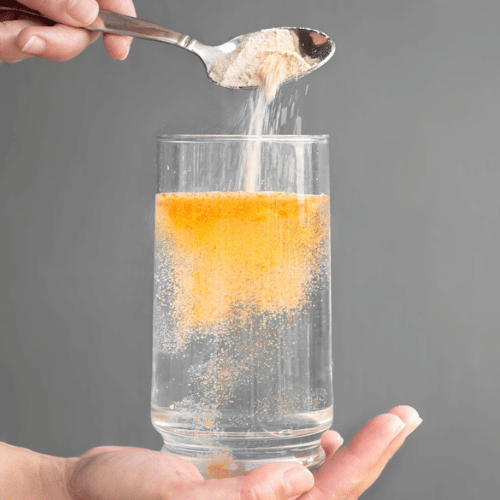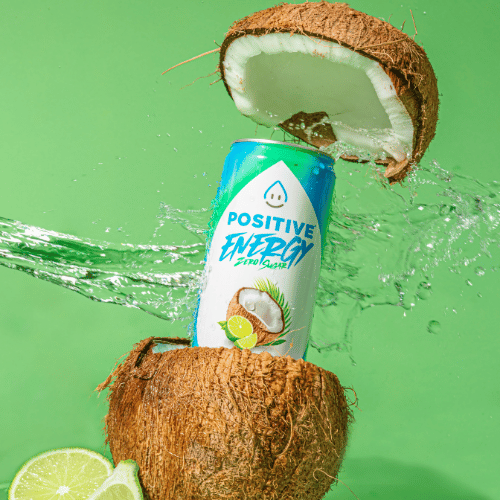Electrolyte powders have become the talk of the town, gracing gym bags and athletes' lockers across the globe. From runners to cyclists, from yogis to bodybuilders, many are turning to these powders to get that extra edge. But amid the flurry of glowing testimonials, a pressing question emerges: "Do electrolyte powders really work?” Are we falling for an expertly crafted marketing pitch or is there genuine science to back their efficacy? In this comprehensive guide, we'll cut through the noise, diving deep into what electrolytes are, how they impact our bodies and the true worth of these powdered formulas. From understanding their core benefits and potential side effects to discerning the genuine products from the gimmicky, we’ve got you covered.
If you've ever hit the wall during a marathon, or if your muscles have betrayed you with a cramp at the worst possible moment, you know the importance of hydration and fuel. However, it's not just about guzzling down water. It's about the delicate balance of electrolytes that keep our body humming like a well-oiled machine. Before you invest in the next trending electrolyte powder, arm yourself with knowledge. Journey with us as we debunk myths, showcase truths, and provide you with all you need to know to decide if electrolyte powders align with your health and performance goals.
Key Takeaways
- Electrolyte powders are effective for maintaining electrolytes, hydration, and athletic performance.
- It is important to be aware of potential drawbacks & risks associated with overconsumption or unnecessary ingredients.
- Healthcare providers should be consulted when determining the best approach for individual needs.
Electrolyte Powder: The Science Behind It

Electrolytes are indispensable minerals that our body needs to function efficiently and sustain the right electrolyte levels. These minerals play a crucial role in:
- Directing water to the necessary areas of the body
- Controlling fluid and water balance
- Transporting nutrients to cells
- Aiding the removal of waste and toxins from cells
- Regulating the body’s acidity and blood pH levels
- Supporting muscle contraction/function
- Aiding in the rebuilding of damaged tissue
The core electrolytes that our body requires are sodium, potassium, and chloride.
Electrolyte powders aim to deliver these essential minerals in a convenient, easily absorbed form to help prevent electrolyte imbalances and support normal bodily functions. Comprehending electrolyte functioning and its significance in the body is fundamental in deciding the need for electrolyte supplementation.
Electrolytes Conduct Electricity
Electrolytes are essential for proper nerve and muscle functioning, as well as for maintaining fluid balance and electrolyte balance. An electrolyte is a substance that conducts electricity when dissolved in a solution or melted, and it is composed of ions that are capable of transmitting an electric charge and can move freely. This process is integral for the normal functioning of bodily processes such as muscle contraction and nerve impulses.
Imagine your body as a finely tuned machine, with electrolytes acting as the spark plugs that keep everything running smoothly. When you exercise or sweat, you lose electrolytes, which can lead to:
- muscle cramps
- fatigue
- dehydration
- dizziness
- nausea
- headaches
If not replenished, these electrolyte imbalances can lead to more serious issues.
Appreciating the significance of electrolytes and their role in maintaining fluid balance, muscle function, and nerve function can guide your decisions about electrolyte supplementation, ensuring your body gets the necessary fuel to perform optimally.
Essential Electrolytes
Electrolyte powders, hydration supplements, and electrolyte supplement products typically contain key electrolytes such as:
- Sodium: essential for maintaining blood pressure and regulating the function of muscles and nerves, which can help prevent muscle cramps
- Potassium: important for maintaining proper fluid balance, nerve function, and muscle contractions
- Magnesium: contributes to the body’s natural stress response and supports proper muscle function
- Calcium: necessary for strong bones and teeth, as well as proper muscle and nerve function
Each of these electrolytes plays a vital role in the body.
Potassium and sodium are both essential to facilitate calcium’s activity. Consuming an electrolyte powder that contains these crucial minerals aids in supplying your body with the essential nutrients to maintain electrolyte balance, particularly during periods of intense physical activity or sickness.
This, in turn, can support optimal muscle function, nerve function, and overall health. And if you want to know more about Electrolytes that can help reduce leg cramps, check out our previous article here:
The Benefits of Using Electrolyte Powders

Electrolyte powders offer numerous benefits, particularly for endurance athletes and individuals experiencing dehydration. They provide a convenient and customizable approach to controlling the amount used, making them a popular choice for electrolyte supplementation. Compared to other forms, electrolyte powders offer precise dosage control, convenience, and the ability to customize your electrolyte intake based on your individual needs.
In the following subsections, we’ll explore the specific advantages of using electrolyte powders, such as improved hydration, enhanced athletic performance, and faster recovery. Understanding these benefits can help you make an informed decision about whether electrolyte powders are the right choice for you.
Improved Hydration
One of the primary benefits of electrolyte powders is their ability to enhance hydration and fluid balance during intense workouts or periods of illness. Electrolyte powders can restore essential minerals that are depleted through perspiration, helping to maintain proper electrolyte levels and prevent dehydration.
Consider the marathon runner pushing through the final miles of a race, or the flu-ridden individual struggling to keep fluids down. In both cases, electrolyte powders in liquid form can provide a vital boost to hydration levels, supporting the body’s ability to perform and recover more effectively.
Maintaining proper hydration and electrolyte balance can enhance athletic performance, reduce the chance of muscle cramps, and promote overall health.
Enhanced Athletic Performance
Electrolyte powders can also have a positive impact on athletic performance by increasing energy levels and improving muscle function. When your body has the right balance of electrolytes, it can function more efficiently, allowing you to push harder and perform better in your chosen sport or workout.
Imagine hitting a new personal record in the gym or shaving minutes off your marathon time, all thanks to the power of optimal electrolyte balance. Incorporating electrolyte powders into your fitness routine could unveil new performance heights and pave the way for success in your athletic endeavors.
Faster Recovery
Post-workout recovery is crucial for maximizing your training efforts and preventing injury. Electrolyte powders can aid in this process by replenishing lost electrolytes and supporting tissue repair. By restoring your body’s electrolyte balance, you can help reduce muscle soreness, minimize fatigue, and get back to your training regimen sooner.
Think of your body like a car that’s just finished a long, grueling race. Refueling with electrolyte powders fills up the tank, providing your body with the necessary resources to repair and rebuild for your subsequent workout or competition.
Potential Drawbacks and Risks

While electrolyte powders can offer numerous benefits, they are not without potential drawbacks and risks. It’s important to be aware of these downsides so that you can make an informed decision about whether electrolyte powders are right for you.
In the following subsections, we’ll discuss the risks associated with overconsumption and imbalances, as well as the potential harm posed by unnecessary ingredients in some electrolyte products. Being aware of these potential issues can help you make the best choices for your health and performance needs.
Overconsumption and Imbalances
Consuming too many electrolytes can lead to imbalances, which can have serious health consequences. One such issue is exercise-associated hyponatremia (EAH), a condition characterized by low sodium levels in the blood. EAH can cause symptoms ranging from:
- mild nausea and headache
- muscle cramps
- confusion and disorientation
- seizures
- severe neurological complications
- coma
- death in extreme cases
It is important to maintain a balance of enough electrolytes in the body to avoid these health risks.
The key to avoiding overconsumption and imbalances is to consume electrolyte powders in moderation and to be mindful of your body’s needs. Listening to your body and adjusting your intake minimizes the risks associated with electrolyte imbalances, allowing you to safely and effectively reap the benefits of electrolyte powders.
Unnecessary Ingredients
Some electrolyte products contain synthetic chemicals, excessive sugar, or other unnecessary ingredients that may be harmful or counterproductive to your health and performance goals. These additives can increase the risk of adverse health effects and may negate the benefits of electrolyte supplementation.
When selecting an electrolyte powder, it’s important to choose a product with a minimal ingredient list and a balanced ratio of essential electrolytes. Avoiding unnecessary additives guarantees that your body receives the nutrients it requires to perform optimally, without any undesired side effects.
When to Use Electrolyte Powders
Knowing when to use electrolyte powders is essential for maximizing their benefits and avoiding potential drawbacks. Electrolyte powders can be beneficial when engaging in intense physical activity, such as running, cycling, or playing sports, as they can help replenish lost electrolytes and maintain hydration. They can also be helpful during periods of illness, such as when experiencing diarrhea, vomiting, or fever, as they can support fluid balance and help prevent dehydration.
Understanding the appropriate time to use electrolyte powders guarantees that your body receives the support it needs to perform and recover effectively in various situations.
Choosing the Right Electrolyte Powder

Selecting the right electrolyte powder for your individual needs is crucial for maximizing its benefits and minimizing potential risks. When evaluating nutrition labels for electrolyte products, consider how the product meets your individual needs, as well as the presence of unnecessary ingredients such as fillers, preservatives, artificial colors, synthetic chemicals, and additives.
Minimal ingredients should be key when looking for an ideal electrolyte powder. Additionally, it is essential to have a balanced ratio of essential electrolytes, such as:
- Sodium
- Chloride
- Potassium
- Calcium
- Magnesium
Choosing a high-quality product that aligns with your nutritional needs allows you to enjoy the benefits of electrolyte powders and minimizes potential risks.
Natural Alternatives to Electrolyte Powders

For those who prefer a more natural approach to maintaining electrolyte balance, there are several alternatives to synthetic electrolyte powders. Some options include:
- Coconut water: a natural source of electrolytes that can help support hydration and fluid balance
- Maple water: provides essential minerals to help maintain electrolyte balance
- Bone broth: contains minerals that can help replenish electrolytes
These natural alternatives, such as electrolyte drinks, can be a healthy and effective way to maintain electrolyte balance.
Incorporating these natural sources of electrolytes into your diet can help you maintain proper electrolyte balance without relying on synthetic powders. Some options to consider include:
- Coconut water
- Watermelon
- Bananas
- Oranges
- Spinach
- Avocado
Exploring these options and identifying what fits you best enables you to cater to your body’s needs in a way that aligns with your preferences and lifestyle.
Insights from the Pros: Unraveling the Electrolyte Debate
Diving into the world of health and fitness, we often look to experts to guide our choices. When it comes to electrolyte powders, healthcare providers and sports dietitians seem to have mixed reviews. Some champion these powders as a lifeline for those pushing their physical limits or battling dehydration. Meanwhile, others wave the flag for a balanced diet and just the right amount of H2O as the key to electrolyte bliss.
So, who's right? Well, think of it as a personal recipe: what works wonders for one might not be the magic mix for another. Rather than just taking a wild guess or going with the latest trend, team up with a trusted healthcare professional or dietitian. They can help tailor the perfect hydration plan that vibes with your lifestyle and goals.
Wrapping Up The Bottom Line: Weighing the Pros and Cons of Electrolyte Powders
So, here's the deal: Electrolyte powders can be your trusty sidekick on your fitness journey, aiding hydration and keeping your performance in tip-top shape. But just like anything, there's a flip side. Overdoing it, opting for less-than-stellar brands, or not tuning into your body can lead to some hiccups.
The trick? Knowledge is power. Dive into the nitty-gritty of the science, be a savvy shopper, and, above all, listen to your body's cues. And remember, when in doubt, your healthcare provider or dietitian is just a call away, ready to guide you in crafting a plan that's uniquely you. Cheers to staying hydrated and empowered!
Before You Leave You Might Want To Look At These Answers To FAQs - Knowledge Is Power!
Do powdered electrolytes work?
Powdered electrolytes can be an effective way to ensure proper hydration, however they should not replace regular water consumption. According to preventive medicine specialist Peter Bastian, MD, MPH, electrolytes are better sourced from foods rather than from processed supplements.
Is it OK to drink electrolyte powder every day?
Drinking electrolyte powder on a daily basis may seem like a good idea, but it can lead to too much potassium, sodium, and other minerals in your body. Electrolytes are important for healthy bodily functions, however, it is best to get them from food rather than processed supplements. Excessively drinking electrolytes can also increase your risk of high blood pressure. Therefore, it is not recommended to drink electrolyte powder every day.
What are the side effects of electrolyte powder?
Electrolyte powder can cause side effects like nausea, muscle cramping, dizziness, fatigue, respiratory depression, confusion, and irritability, as well as more serious symptoms such as seizures, swelling of ankles/feet, mental/mood changes, and a significant decrease in blood pressure. Seek medical help if you experience any concerning side effects.
What are the primary electrolytes found in the body?
The primary electrolytes in the body are sodium, potassium, and chloride.
How do electrolytes conduct electricity?
Electrolytes allow ions to move through them, carrying an electric charge and thus conducting electricity.
Thanks for taking this journey with us to explore the ins and outs of Electrolyte Powders. And, don't forget to check out our review article on the top electrolytes for leg cramps.
Also, please come back soon to check out our next review of another awesome supplement – we’re always looking out for YOU!
*We are not qualified medical advisors. The content here is only based on our personal opinions and should NOT be used as a substitute for a healthcare professional's advice!











Member discussion